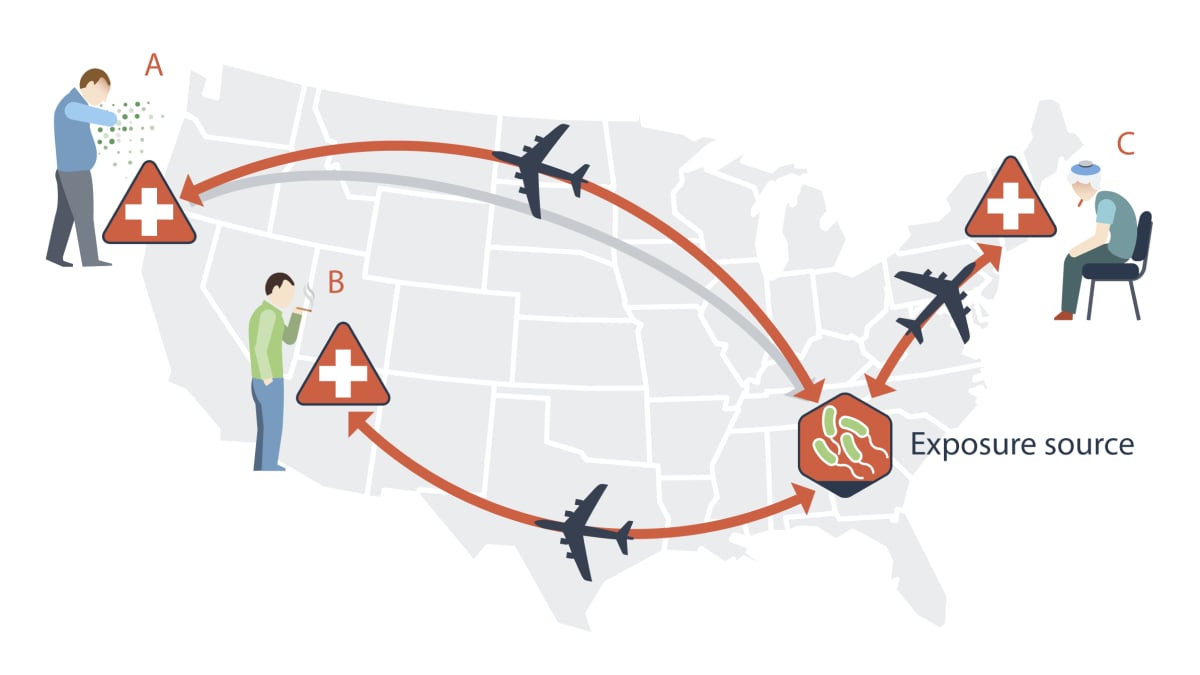Key points
- CDC defines travel-associated outbreaks as two or more cases associated with the same travel accommodation in a 12-month period.
- This includes both Legionnaires' disease and Pontiac fever cases.
- The information below supplements the considerations for all facilities, adding special considerations and specific activities for travel-associated outbreaks.

Recommendations
Conduct a full investigation
Two or more cases justifies a full investigation if the people meet both of the following criteria:
- Stayed overnight in the same accommodation during exposure period
- Had symptom onsets within 12 months of each other
Exposure periods
- 14 days before date of symptom onset
- 24 to 72 hours before symptom onset
Consider conducting a full investigation
The following situations are examples of where public health officials may want to consider conducting a full investigation.
- Cases further apart in time
- Case following an outbreak
- Cases without overnight stays
Cases further apart in time
A full investigation can be considered if an accommodation is associated with cases over a period of several years.
Potable water outbreaks may not be as easy to detect as cooling tower outbreaks. Cooling tower outbreaks tend to cause cases that are more tightly clustered in time. Without remediation, building water systems colonized with Legionella may cause sporadic-appearing cases over years before a problem is recognized12.
Case following an outbreak
Identifying a single case following a previously recognized outbreak at the same accommodation can raise concerns that might justify an investigation.
Cases without overnight stays
Sometimes people who spend time at an accommodation but were not overnight guests can develop illness. These people can include staff and visitors.
Considerations for a modified investigation
If available epidemiologic evidence isn't strong enough to warrant environmental sampling, consider at least conducting an environmental assessment. Look to see if conditions for Legionella growth exist in the building water systems or devices where people may've been exposed. The environmental assessment findings can then inform a decision about sampling for Legionella.
Ask the accommodation owner/manager whether the building has a water management program. If not and the building should have one, provide information about water management programs and encourage implementation.
Specific activities
Obtain as detailed of an exposure history as possible for each case from the patient or a proxy. Sometimes a second interview can be helpful using a modified questionnaire based on new information gathered during the investigation.
CDC's Line List Templates are helpful to summarize case demographic, clinical, and exposure information specific to a travel-associated outbreak.
Notify CDC of the outbreak via travellegionella@cdc.gov. CDC staff can search for additional cases among people who reported staying at the accommodation during their exposure periods.
Submit an Epi-X call for cases to alert other states. Request states immediately report any additional cases associated with the accommodation to the investigating agency. Don't have contributor access to Epi-X? Email travellegionella@cdc.gov for support.
Communication strategies
Notify the accommodation manager or owner about the outbreak. Ask management about guests or employees who've reported Legionnaires' disease symptoms or illness. Ask management to report any consistent illnesses to the health department.
Depending on the circumstances, consider notifying incoming guests and staff about
- Possible exposure to Legionella
- Symptoms of Legionnaires' disease and Pontiac fever
Encourage them to speak with their physician if they develop symptoms.
If the cases were recent, request a guest list for the prior investigation time period. Consider notifying past guests of their possible exposure to Legionella. If they're still within the exposure period or recently developed illness, it may prompt them to seek care.
Review employee absentee data or employee clinic records to obtain information about clinically compatible illnesses among staff.
- Cowgill KD, Lucas CE, Benson RF, et al. Recurrence of Legionnaires' disease at a hotel in the United States Virgin Islands over a 20-year period. Clin Infect Dis. 2005;40(8):1205–7.
- Silk BJ, Moore MR, Bergtholdt, et al. Eight years of Legionnaires' disease transmission in travelers to a condominium complex in Las Vegas, Nevada. Epidemiol Infect. 2012;140(11):1993–2002.
